| Article ID | Journal | Published Year | Pages | File Type |
|---|---|---|---|---|
| 4214464 | Revista Portuguesa de Pneumologia | 2007 | 4 Pages |
Biological agents which specifically block tumor necrosis factor (TNF) have been reported as useful in treating sarcoidsis. Over the past four years, many centers in America have reported on the use of one or more anti-TNF agent. These are: the TNF receptor antagonist etanerecept, the chimeric monoclonal antibody infliximab, and the humanized monoclonal antibody adalimumab. Infliximab is given intravenously, while etanerecept and adalimumab are given subcutaneously. In the reports to date, infliximab appears to be the most effective in treating sarcoidosis. At the University of Cincinnati, 122 treatment regimens have been given with the various agents (13 with etanerecept, 27 with adalimumab, and 82 with infliximab). Of the infliximab treated patients, 58 (71%) improved, while only 13 (48%) improve on adalimumab and 3 (23%) on etanerecept. Clinical worsening of the sarcoidosis occurred in 5 (38%) of the etanerecept and 10 (37%) of the adalimumab patients, while only 11 (13%) of the infliximab patients (Chi square = 15.80, p<0.005). These observations suggest that there is a difference in response to anti-TNF agents in treating sarcoidosis.
